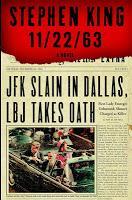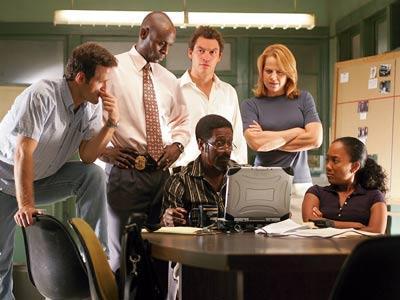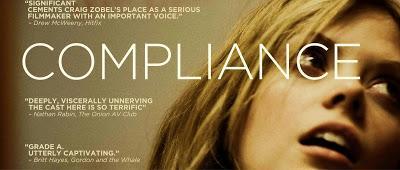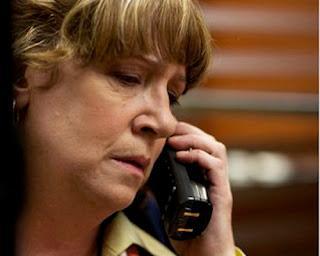
We've been bad bloggers lately. Between continuing to plug along through Stephen King's 11/22/63, which I'm loving, watching old episodes of American Horror Story and The Wire, and ... y'know ... working and parenting and stuff, there hasn't been time to finish books, watch new movies, or blog.

Sarah and I are still digging The Wire. We do love complex, morally ambiguous characters, and there is a load of them here.

She and I watch American Horror Story with John on nights he's off work. It's an interesting pastiche of ghost stories and horror films, with shades of The Shining and Rosemary's Baby, that is if Rosemary decided to forgo chowing down on a little raw meat in favor of a nice bloody raw brain. It's definitely beyond by fucked-upness threshold, especially with the recurring theme of dead babies, one of the few things I consistently can't stomach. Yet I can't look away. :-)

Last weekend, Sarah and I watched Compliance, the next movie I plan to discuss with her and James as part of homeschool. This film was difficult to sit through, especially for Sarah. This kid, who introduced me to the likes of Tyrannosaur and Red, White and Blue, found Compliance too disturbing. She swears this is my ultimate revenge for all the spectacularly unsettling movies she's gotten me to watch.
Compliance is set in a fictional fast food restaurant. Sandra (Ann Dowd) is the middle-aged manager, responsible for a fast-paced business and harangued by her regional manager. One of her employees is Becky (Dreama Walker), barely out of her teens, who works at the counter. From the beginning you sense that Sandra is a bit jealous of the younger, more conventionally attractive woman -- there's subtle tension there. We also sense that she is intimidated by male authority. The stage is set.

A man calls the restaurant, claiming to be a police officer named Daniels, and solicits Sandra's help with an "investigation." He claims to have spoken with the regional manager and says an employee allegedly stole money from a customer. The police are too busy, with another investigation, to attend to the matter personally so Sandra needs to detain and question the employee about the theft. With Daniels on the phone, Sandra summons Becky, who loosely fits the description of the suspect, to the back of the restaurant.
Becky denies the charges, but she complies with the "investigation." Daniels tells Sandra to search Becky's pockets and purse for the stolen cash. When the money is not found, claiming that the alternative would be taking Becky to jail, he tells her to conduct a strip search. Then Becky's clothing needs to be removed from the building. And it doesn't stop there.
When Sandra insists that she needs to return to work, Daniels tells her to have a man come to the back room to watch Becky "for security purposes." Before long, a male employee is with Becky, who is trying to shield her naked body with an apron, as Daniels continues to ask questions and give instructions. Though he's a bit more assertive that Sandra, the male employee still doesn't hang up the damn phone when Daniels asks "What do her nipples look like?" I won't tell you just how far this goes. I'll leave you to discover this for yourself. And you'll understand why this tense, infuriating movie had many patrons walking out of the theater.

When John tells me war stories from police work, my reaction is frequently "People cannot possibly be that stupid!" Unfortunately, of course, I'm always wrong -- you'd think I'd just quit saying it. But I never cease to be astonished that the same species responsible for great works of art and quantum theory instigates all the spectacular idiocy that -- ironically -- gives my husband job security.
My reaction to Compliance was similar. People behave so mindlessly that the story wouldn't seem plausible, had we not already known it was closely based on actual events. Even with a true story as its backbone, this film couldn't have worked were it not for skillful writing and direction and outstanding performances. The acting is very natural, and the whole cast plays their roles with just the right amount of subtlety. Ann Dowd, as Sandra, artfully walks the line between passive aggressive hostility toward Becky and innocent bewilderment, discomfort, and sympathy for the younger woman.
Everything feels wholly real. And while the situation onscreen seems absurd beyond belief, it's presented with enough complexity and subtlety that I couldn't dismiss the story or the characters. This is definitely not a "fun" movie, but it's a very worthwhile film, and watching it was one of the more thought-provoking experiences I've had in a while.
It leaves us with the obvious question -- how in the name of all things holy does something like this happen? Even assuming someone will buy into the proposition that a police officer would actually carry out an investigation by proxy, why would anyone cross the line into agreeing to perform a strip search? A cavity search? And worse?
Why do seemingly "normal" people seemingly discard morality and common sense to comply with individuals seen as authority figures? I sometimes find myself pondering a related question, when reading about the ubiquitous problem of school bullying and myriad other situations. In a culture that prizes individuality so highly, why do we often see such a mindless herd mentality?
Topics I Want to Discuss With My Teens:
- In what circumstances is obedience to authority a good thing? In what circumstances is it a bad thing?
- Issues related to gender. Sandra definitely seemed more comfortable wielding her authority over females than males, and it seemed natural to her to put in man "in charge." Furthermore she seemed to feel rather powerless, which may have fueled a bit of passive aggressive hostility toward Becky. I'm not sure where I'm going with this, but it seems impossible to fully discuss Compliance without touching on this issue.
- Famous Experiments by Stanley Milgram, studied by director Craig Zobel when preparing for this movie.
- Zimbardo's Prison Experiment
- Perpetrators of the Holocaust -- "I was just following orders" -- this dovetails with our ongoing studies of WW II.
- The Mai Lai Massacre during the Vietnam War
- The Jim Jones cult in Guyana
- Behavior by people on both sides at the infamous incident in Waco, triggered by cult leader David Koresh
- Going back to my question, why do seemingly "normal" people seem to discard morality and common sense to comply with individuals seen as authority figures? And why do we often see such a mindless herd mentality? Is this something we are all guilty of, to some extent?
- John Taylor Gatto's famous essay titled "The Seven Lesson Schoolteacher" is famous in unschooling circles. Writers like him state that the primary function of public schools is to teach conformity and compliance. Some have argued that compulsory schooling, established around the same time as the industrial revolution, was primarily instituted to provide compliant workers -- fodder for the factories and mills.
I don't agree with this scathing indictment of the public school system. (And as a side note, I worked with troubled youth in public schools for years. I didn't see a whole lot of compliance with authority going on. Many kids would've been better off if they'd complied with authority a bit more and quit shooting themselves in the foot. ;-))
I'll enthusiastically defend compulsory education and the institution of public education, which is the foundation of a democracy -- y'know like that guy Thomas Jefferson said. ;-) And I think public schools are used as a whipping boy far too much already.
On the other hand, in my experience, schools are -- in part -- held hostage to a standardized test driven culture which tends to prize compliance and conformity over creativity and complex thought. This isn't the fault of teachers or principals -- it's a political thing. If we want to create responsible citizens, is this a problem that needs to be addressed?
Do "ordinary" people often get dangerously caught up in dangerous acts of mindless compliance to "authority" Or are incidents like those seen in Compliance isolated events based on ignorance and poor judgment?
How do we raise a generation of citizens with the confidence to think for itself and stand up for what is right?
